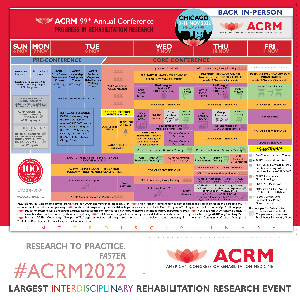Back
Trauma
Does burnout effect the self-efficacy of occupational therapists?
Does Burnout Affect the Self-Efficacy of Occupational Therapists?
Wednesday, November 9, 2022
3:56 PM – 4:01 PM
Location: Station 7

Stacey D. Huffman, OTD (she/her/hers)
Assistant Professor of Occupational Therapy
Drake University
Marshalltown, Iowa, United States
Presenting Author(s)
Research Objectives: To investigate the lived experiences of those feeling the effects of burnout as school-based occupational therapists and understand the experience of the one person not experiencing symptoms of burnout.
To investigate the impact that burnout has on an occupational therapist's self-efficacy.
Design: A qualitative short-length study to understand the phenomenon that is burnout and its effect on self-efficacy in occupational therapists that work in school-based practices. This study was an interview process to examine factors that contribute to burnout and lower self-efficacy in school-based occupational therapy practitioners
Setting: Study setting included four occupational therapists working in school-based practices, three interviews done via Zoom and the fourth interview done in person.
Participants: Voluntary participants from an Iowa AEA and social media connections. Four participated, two from Iowa, one from Arizona, and one from Texas
Interventions: Study intentionally utilized empathy and mindful listening, which are beginning-level coaching strategies in the interviews, to examine factors that contribute to burnout and lower self-efficacy in school-based occupational therapy practitioners.
Main Outcome Measures: Thematic coding was done with the interview transcripts looking for similar themes. A total number of codes were calculated as was the total number of codes per theme and then the total codes per participant.
Results: Common themes found were high workload (36% of total codes), decreased self-efficacy (41% of total codes), Health impairments (8% of total), resiliency (9% code total), professional identity (2% of total) and connection (5% of total).
Conclusions: Evidence indicates a possible relationship between high workloads and decreases in self-efficacy. More extensive studies are indicated to examine decreases in self-efficacy among occupational therapists as a profession to develop programming for burnout prevention.
Author(s) Disclosures: None
To investigate the impact that burnout has on an occupational therapist's self-efficacy.
Design: A qualitative short-length study to understand the phenomenon that is burnout and its effect on self-efficacy in occupational therapists that work in school-based practices. This study was an interview process to examine factors that contribute to burnout and lower self-efficacy in school-based occupational therapy practitioners
Setting: Study setting included four occupational therapists working in school-based practices, three interviews done via Zoom and the fourth interview done in person.
Participants: Voluntary participants from an Iowa AEA and social media connections. Four participated, two from Iowa, one from Arizona, and one from Texas
Interventions: Study intentionally utilized empathy and mindful listening, which are beginning-level coaching strategies in the interviews, to examine factors that contribute to burnout and lower self-efficacy in school-based occupational therapy practitioners.
Main Outcome Measures: Thematic coding was done with the interview transcripts looking for similar themes. A total number of codes were calculated as was the total number of codes per theme and then the total codes per participant.
Results: Common themes found were high workload (36% of total codes), decreased self-efficacy (41% of total codes), Health impairments (8% of total), resiliency (9% code total), professional identity (2% of total) and connection (5% of total).
Conclusions: Evidence indicates a possible relationship between high workloads and decreases in self-efficacy. More extensive studies are indicated to examine decreases in self-efficacy among occupational therapists as a profession to develop programming for burnout prevention.
Author(s) Disclosures: None
Learning Objectives:
- Upon completion, participants will be able to list the common factors leading to burnout in school-based occupational therapists.
- Upon completion, participants will be able to describe the effects decreased self-efficacy has on occupational therapists
- Upon completion, participants will describe the importance of empathy and active listening as coaching components to build connection.

.jpg)
